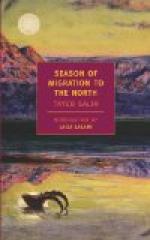Peace River Crossing is in latitude 56 deg. N. and longitude 117 deg. 20’ W. From that far-off day in spring when we first touched the Clearwater we have been following in the historic footprints of Sir Alexander Mackenzie. We now take a day off, with the object of locating Mackenzie’s last camp on the Peace, which he reached in 1792 and from which, in the spring of 1793, he started west across the map seeking an unknown route to the Pacific Ocean. We find the remains of that camp. It is in the corner of a potato-field a little way beyond Peace River Crossing and on the opposite side of the river. Only the foundations of the walls are left and the crumbling bricks of two old chimneys. Mackenzie was the first man to cross the continent from sea to sea north of the latitude of Mexico, and it was from this point where we stand that he launched his ambitious canoe. There is no more historic spot on the continent than that on which we stand this September day, and as yet it is all unmarked of commemorative stone or recording tablet. The lost camp had never been photographed until we brought our inquisitive camera to bear upon it.
I stoop and pluck from where it nods behind the old chimney a wild larkspur, and as I half-mechanically count its forty-two seed-pods, I try hard to throw back my thoughts to the year 1792,—one hundred and sixteen years. It is a far call! Canada is tardy in her recognition of her early builders of Empire. Our cousins to the south would appear to be more appreciative. In song and story and by a memorial World’s Fair the people of the United States have honoured the discoveries of Lewis and Clark, but Mackenzie crossed the continent a full dozen years in advance of these explorers.
[Illustration: The Site of old Fort McLeod]
Our mind feels back across the centuries to little-known Montreal where, amid the bales of peltries and the trading-trinkets of the Fur Company, a hidden voice is speaking and a young man listens. That young man is Alexander Mackenzie, a self-taught Scot, a Canadian bourgeois. In the noisy midday clatter of the fort he hears the voice, in the waking hours of dawn and “when evening shuts the deed off, calls the glory from the grey.” He cannot get away from that haunting challenge, he would not if he could. There are interminable changes rung on the everlasting whisper, but its burden is ever the same.
“Something lost behind the Ranges,
Lost and waiting for you: Go!”
No more might it satisfy him to out-do his competitors and carry back to Grand Portage canoes overflowing with furs. We have seen how the doughty and determined Scot followed to the Arctic the river which now bears his name. It gives us the measure of the man to know that the thought uppermost in the mind of Mackenzie returning from the Arctic was not pride in the deed accomplished but a realization of his limitations in astronomical knowledge. He would go back to




